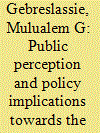|
|
|
Sort Order |
|
|
|
Items / Page
|
|
|
|
|
|
|
| Srl | Item |
| 1 |
ID:
117107


|
|
|
| 2 |
ID:
157350


|
|
|
|
|
| Summary/Abstract |
How does the acquisition of latent nuclear capabilities—in the form of enrichment and reprocessing facilities—affect a state’s military security and bargaining power? On the one hand, nuclear latency might serve as a “virtual deterrent” against would-be aggressors, as well as a bargaining chip in international negotiations. On the other hand, some research holds that states cannot deter military challenges without at least a deliverable nuclear device. Other scholarship suggests that a state’s pursuit of latency invites nonproliferation sanctions and preventive strikes. We address this debate by quantitatively investigating the conditions when latency benefits or burdens states in their international interactions. To do so, we analyze a dataset of latency measures and a variety of military and bargaining outcomes. The results suggest that latency invites coercion without producing deterrence. Our findings imply that post–Joint Comprehensive Plan of Action (JCPOA), latency is more likely to undermine Iran’s economic and military well-being than it is to benefit its prosperity or security. That, in turn, suggests that the JCPOA will not increase Iran’s deterrent capability or its international influence, a fact that should temper fears about the negative consequences of the agreement.
|
|
|
|
|
|
|
|
|
|
|
|
|
|
|
|
| 3 |
ID:
150648


|
|
|
|
|
| Summary/Abstract |
The European Commission's Target Electricity Model (TEM) aims to integrate EU electricity markets. This paper estimates the potential benefit of coupling interconnectors to increase the efficiency of trading day-ahead, intra-day and balancing services across borders. Further gains are possible by eliminating unscheduled flows and avoiding the curtailment of renewables with better market design. In the short run the gains could be as high as €3.9 billion/yr, more than 100% of the current gains from trade. About one-quarter of this total comes from day-ahead coupling and another third from shared balancing. If shared balancing is so valuable, completing the TEM becomes more urgent, and regulators should ensure these gains are paid to interconnectors to make the needed investment in the cross-border links more commercially profitable.
|
|
|
|
|
|
|
|
|
|
|
|
|
|
|
|
| 4 |
ID:
100954


|
|
|
|
|
| Publication |
2010.
|
| Summary/Abstract |
What is the case for defence and is it a worthwhile investment? This question is addressed for two contrasting nations, namely, the UK and New Zealand. Economists have a set of standard analytical tools for addressing the question but they are difficult to operationalise. This paper provides policy-relevant answers.
|
|
|
|
|
|
|
|
|
|
|
|
|
|
|
|
| 5 |
ID:
117898


|
|
|
|
|
| Publication |
2013.
|
| Summary/Abstract |
This article outlines the widespread needs of South African military veterans and the possible consequences if the promises made in the recent Military Veterans Act are not met. The first part of the article defines who generally qualifies as a military veteran, how they are typically compensated in various countries with specific reference to neighbouring southern African countries, and what the consequences are when veterans become disenchanted with the state. The second part focuses on South Africa and the recent debates on military veterans and their entitlements. With reference to the findings of a qualitative study conducted among military veterans, parliamentary debates and media reports, an assessment is made of the demands and affordability of promised benefits and the consequences should the state not deliver. The conclusion is reached that heightened expectations are presently frustrated by slow roll-outs, and this is likely to increase the possibility of protest action. This has now the potential to create further tension within the ruling party and civil society, as the pressure on public finances mounts and demands become unsustainable. The effect this may have on political stability will depend on how the government manages this issue.
|
|
|
|
|
|
|
|
|
|
|
|
|
|
|
|
| 6 |
ID:
145560


|
|
|
|
|
| Summary/Abstract |
In this article, we review the EU's significance for social policies in the UK. The EU has a limited legal role or institutional capacity to directly regulate the social policies of its member states. This role is even more limited in the case of non-eurozone countries. There are a handful of EU policy measures which have had effects on social policy in the UK. However, these effects have not changed the institutional arrangements for making, organising and delivering social policy, which remain firmly in the hands of UK governments. In consequence, a ‘Leave’ or ‘Remain’ result has relatively limited implications for social policy, except in the case of specific social groups: notably for UK and other EU nationals who have lived and worked in at least one other EU country. Other EU legislation and regulation is compatible with the current and historical policy preferences of UK governments and political parties.
|
|
|
|
|
|
|
|
|
|
|
|
|
|
|
|
| 7 |
ID:
182459


|
|
|
|
|
| Summary/Abstract |
Meaningful community participation is core to the long-term success of protected areas. Hence, it is important to understand what drives neighbouring community attitudes and perceptions. This study sought to determine local community attitudes towards conservation and protected areas, as well as their perceptions of benefits and participation at Borakalalo National Park. Semi-structured interviews were held with experienced park officials, while a structured household survey and focus group discussions were conducted across five surrounding villages. The results highlighted a number of interesting findings, including widespread support for biodiversity conservation and protected areas offset by considerable negativity towards Borakalalo itself. It was also determined, despite stated co-management policies, community residents perceived there was little meaningful participation and benefits were poorly communicated and unfairly distributed. Pragmatic suggestions were made for jointly developing more effective participation with the communities, despite limited available resources.
|
|
|
|
|
|
|
|
|
|
|
|
|
|
|
|
| 8 |
ID:
111391


|
|
|
|
|
| Publication |
2012.
|
| Summary/Abstract |
The integration of large-scale wind power has brought about a series of challenges to the power industry, but at the same time a number of benefits are being realized. Among those, the ability of wind power to cause a decline in the electricity market prices has been recognized. In quantifying this effect, some models used in recent years are based on simulations of the market supply-side and the price clearing process. The accuracy of the estimates depend on the quality of the input data, the veracity of the adopted scenarios and the rigorousness of the solution technique. In this work, a series of econometric techniques based on actual ex post wind power and electricity price data are implemented for the estimation of the impact of region-wide wind power integration on the local electricity market clearing prices and the trading savings that stem from this effect. The model is applied to the case of Spain, where the estimated savings are compared against actual credit and bonus expenses to ratepayers. The implications and extent of these results for current and future renewable energy policy-making are discussed.
|
|
|
|
|
|
|
|
|
|
|
|
|
|
|
|
| 9 |
ID:
076503


|
|
|
| 10 |
ID:
176672


|
|
|
|
|
| Summary/Abstract |
As part of the global effort in the development and deployment of renewable energy, Ethiopia is aggressively working to increase the share of those energy resources into the energy mix. Ethiopia is known for the use of hydropower generation systems but recently the country is introducing wind energy technologies and developed wind farms that started power generation in 2011. However, the public perception towards this new entrant of power generation system is not well understood. This paper therefore explores the perception of the public living within the wind farms. This is achieved through structured survey and conducting household level discussions with the community. The results showed that generally the public is supportive of such development but critical issues have been raised such as lack of prior consultation with the community by the developers, fairness of land compensation and generally lack of inclusive benefit packages from the wind farm development for the community. With the country planning for new wind farm development, it is crucial to devise comprehensive solutions and consider the recommended policy directions in this paper in order to develop public confidence and ownership for sustainability of the developed power generation systems.
|
|
|
|
|
|
|
|
|
|
|
|
|
|
|
|
| 11 |
ID:
149936


|
|
|
|
|
| Summary/Abstract |
Growing awareness of the potential for some energy-related activities to induce earthquakes has created a need to understand how the public evaluates the risks of induced earthquakes versus the benefits of energy development. To address this need, this study presents a web survey that used a between-subjects factorial experimental design to explore the views of 325 U.S. adults, who were asked about their experiences with earthquakes; risk perceptions related to different causes of earthquakes (e.g., natural versus induced); and acceptability of earthquakes depending on the benefits, beneficiaries, and decision making process. The results found that participants had more negative feelings toward induced versus naturally occurring earthquakes. Although they judged no earthquake as “acceptable,” participants rated induced earthquakes significantly less acceptable than naturally occurring ones. Attributing the benefits to the provision of renewable energy or climate change mitigation did not increase induced earthquake acceptability, and no particular beneficiary made earthquakes more acceptable, although private companies as beneficiaries made earthquakes less acceptable. Finally, induced earthquake acceptability was significantly higher when people believed that people like them had a voice in the decision to implement the technology that caused the earthquake, underscoring the importance of public engagement in the development of energy technologies.
|
|
|
|
|
|
|
|
|
|
|
|
|
|
|
|
| 12 |
ID:
118827


|
|
|
|
|
| Publication |
2013.
|
| Summary/Abstract |
We analyze the return on investment of the U.S. federal government's clean coal technology (CCT) program for the period 2000-2020. We estimate total costs to government and industry and quantify benefits for: (1) Reduced capital costs of advanced technologies in new plants; (2) Reduced capital and operating costs at existing plants to remain compliant with environmental regulations; (3) Reduced fuel costs due to higher efficiencies; (4) Avoided environmental costs; (5) The value of clean coal technology export sales; (6) Jobs created. We find that benefits over the 20-year period total $111 billion (2008 dollars); the benefits in individual categories range from $15 billion in fuel cost savings to $39 billion for capital and technology cost savings in new and existing plants; and that total jobs created exceed 1.2 million, with an annual average of about 60,000 jobs created. We also find that the return on investment to DOE from the CCT program is favorable and is growing rapidly: By 2020, the cumulative DOE costs will likely total $8.5 billion, for an ROI of more than 13.
|
|
|
|
|
|
|
|
|
|
|
|
|
|
|
|
| 13 |
ID:
187595


|
|
|
|
|
| Summary/Abstract |
Community ownership of wind energy has been found to increase acceptance, but the reasons for this are poorly understood. Here, we compare different communities’ attitudes towards local onshore wind energy projects in order to gain a deeper understanding of the characteristics of ownership which are conducive to community acceptance. Using a postal survey in Scotland (n = 318), we compared three communities with varying degrees of ownership regarding their (1) support for the local wind project; (2) perceptions of energy justice; (3) perceived impacts; and (4) ownership and benefit preferences. One-way ANOVAs and the Potential for Conflict Index2 identified that residents in the two communities with a degree of ownership were more associated with greater acceptance, processes, and outcomes (i.e. more just and inclusive development processes and more fairly distributed benefits and impacts), than residents living near the privately-owned development. Additionally, we provide evidence that a co-operative can achieve similar acceptance and energy justice as a fully community-owned project. Overall, the results indicate that policymakers should take seriously the connection between the tenets of energy justice and ownership models in their policy and planning efforts.
|
|
|
|
|
|
|
|
|
|
|
|
|
|
|
|
|
|
|
|
|